Salute to heroes
CPV soldiers confident in young Chinese generations inheriting their spirit
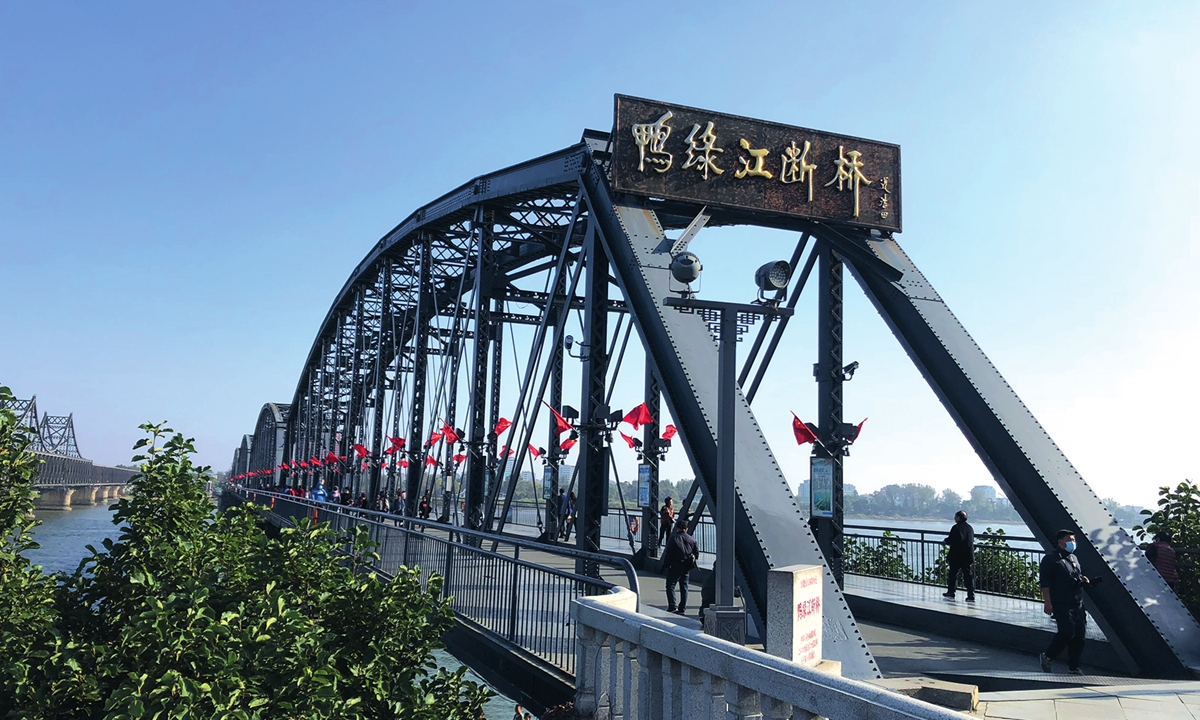
The Yalu River Broken Bridge in Dandong, Northeast China's Liaoning Province Photo: Li Qiao/GT
Editor's Note:
This year marks the 70th anniversary of Chinese People's Volunteers (CPV) army's participation in the War to Resist US Aggression and Aid Korea (1950-53). A total of 2.9 million CPV soldiers participated in the Korean War and 197,653 of them sacrificed their lives to defend North Korea and their motherland by resisting US aggression.
In 1950, China's total industrial and agricultural output value was 57.4 billion yuan ($22.9 billion), compared to the US total output of $284.8 billion. That year, China's steel production was 606,000 tons while the US produced 87.72 million tons. Under such difficult conditions and wide gaps, CPV soldiers still defeated enemies with their strong will. They were honored as "the most admirable people" in China.
The Global Times reporters Li Qiao and Lin Luwen interviewed CPV soldiers in Beijing and border city Dandong, Northeast China's Liaoning Province, learning their battle stories and their expectations of the young generation to inherit their spirit.
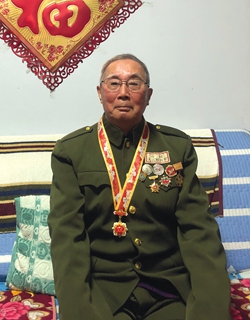
Xie Changping Photo: Li Qiao/GT
Xie Changping
Every morning, 87-year-old CPV soldier Xie Changping walks along the bank of Yalu River dividing North Korea and China in Dandong, recalling the memory when he entered North Korea on a barge across the river as a signaller to participate in the Korean War. He was only 16 years old.
"Seventy years have passed. What I miss the most are the soldiers who were responsible for digging military tunnels," Xie told the Global Times.
Xie shared the memory of two soldiers in their twenties sawing an enemy's bomb in a military tunnel. "They were collecting explosives, iron, and wires for war supplies. CPV soldiers had totally disregarded personal safety then. All of us were determined to devote ourselves when we joined the army," Xie noted.
The air was thick with dust when digging the military tunnels. The likelihood of suffering lung disease was high. "Had they come back to the motherland safely? Did they get married, have children and enjoy a happy life as I do?" Xie always wonders.
Xie said the first three months of marching to the military demarcation line took place under intensely difficult conditions. Each soldier carried 30 kilograms of supplies and marched 30 kilometers a day. They slept on the ground and drank farmland water. "I felt I was only clear-headed when bombs exploded. Sometimes I was so exhausted that I even fell asleep while walking," Xie said.
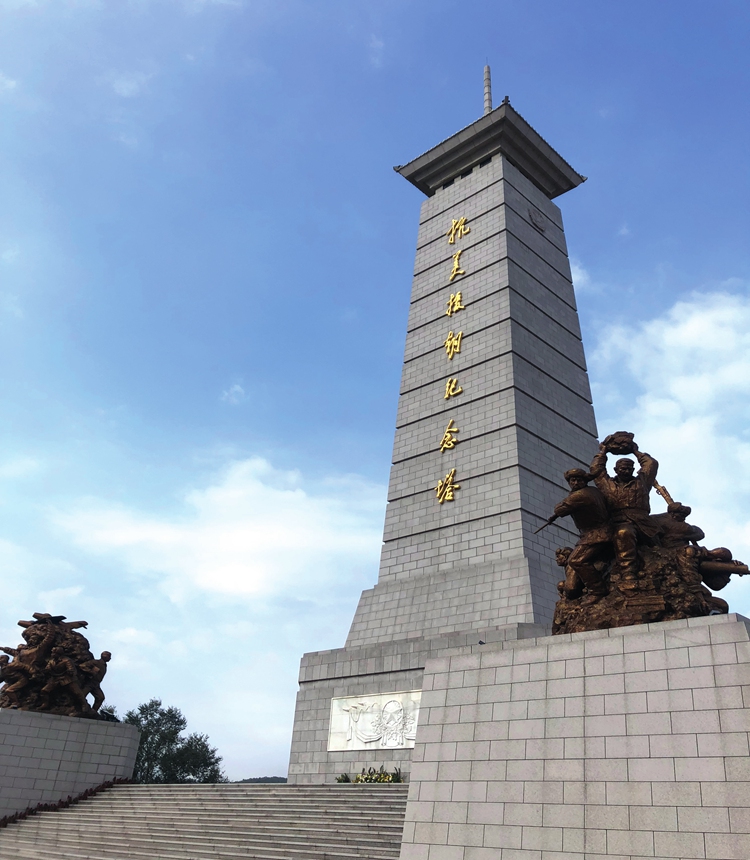
The memorial tower commemorating the War to Resist US Aggression and Aid Korea in Dandong Photo: Li Qiao/GT
Xie and his training regiment were ordered to return to China and bring new soldiers to the front line once they reached the military demarcation line. Though critical for the war effort, the task involved a great risk; it made them targets of US bombing campaigns.
"We were about to be treated to rice and tofu by a civilian Korean family one night of the Spring Festival in 1951 when the US Army's bombs attacked us," Xie recalled.
Two comrades living with Xie were injured and more than 100 soldiers in Xie's regiment died in the attack.
Xie watched the Korean grandmother drag her husband's dead body from her home to a pit outside to bury his corpse with snow. Before the attack, they were just sitting together and enjoying dinner, Xie recalled.
At a simple memorial meeting, the leader of Xie's training regiment said "Rest in peace, our comrades! We must win this war with your unfulfilled wishes."
Xie returned to North Korea in July 1951 as a soldier dedicated to raising the morale of soldiers in combat.
Xie was versed in Shandong Allegro and Pingju opera and, even learned Korean songs and dances to perform for exhausted soldiers.
Xie said he tried his best to cheer up his comrades. Small slideshows made by shoeboxes, flashlights and cellophane were shown on the walls of the tunnel with messages praising individual soldiers. "Warrior Wang, you are the hero!" read one slide.
The soldiers were delighted to see their names on the wall, Xie said.
Hearing the news of the armistice, Chinese soldiers and North Koreans all came out to sing and dance together with a smile of light joy on faces, Xie recalled.
"Confronting the current US campaign to contain China, our young people have to be self-confident and work hard on any small step of work. We were able to defeat the US with poor military resources 70 years ago, relying on our devoting spirit; our young people can also resist American repression now," Xie noted.
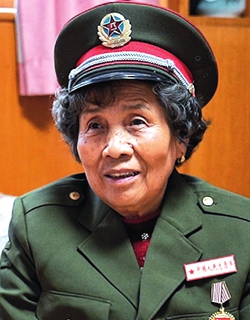
Jin Yuzi Photo: Lin Luwen/GT
Jin Yuzi
"I was not scared of death. I only thought of seizing time to save soldiers at the North Korea battlefield," 85-year old Korean Chinese Jin Yuzi, a female medical soldier who served in the war, told the Global Times.
In 1951, 15-year-old Jin Yuzi joined the CPV, following in her brother's footsteps, despite her father's opposition. "Schools were stopped because of the war. I also wanted to contribute in resisting US aggression and aiding Korea, regardless of the fact I was a girl," Jin said.
Once traveling across the Yalu River to North Korea, Jin said the sight of the bomber made her feel scared and worried about her choice to enlist. "I forgot my fears as soon as I began treating the wounded," she said.
The living conditions of North Korean people were austere during the war. After arriving at the front line, Jin did not eat or drink for two days. But she did not feel hungry.
The rescue station was set up in the cave where Jin had to care for more than 40 wounded soldiers and guard against enemy planes.
"Once I was rescuing a wounded soldier and the enemy aircraft bombed around. I covered him with my body. However, when the enemy plane left, I found that he had already gave his last breath," Jin said.
Jin later got used to the bombs of enemy aircrafts. Medical soldiers had to concentrate on saving lives, even when the ground was full of dead bodies.
Jin treated two captured US soldiers. The two refused to eat or drink. Although they could not communicate with English or Chinese, Jin used body language to persuade them to eat. "You will starve to death if you do not eat," Jin told them.
"Although we vehemently oppose US aggression, the captured US soldiers are also human. We would certainly save them out of humanitarian spirit," Jin noted.
Jin commended the devotion of young medical workers who aided Wuhan in treating COVID-19 patients at the outbreak.
"They were bravely rushing to the medical front line, not fearing getting infected, just like us before," Jin said. "I believe young people can inherit their spirit in the new era."
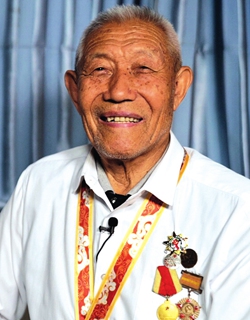
Yin Jixian Photo: Lin Luwen/GT
Yin Jixian
Yin Jixian, an 88-year-old CPV soldier, is well-known for answering the Korean War related questions on Zhihu, China's Quora-like Q&A platform.
When someone doubted the necessity of aiding North Korea and judged that aiding North Korea was wrong, it irritated Yin to go online and tell his story from the battlefield. "If the US occupied North Korea and set up military bases, then the border between China and North Korea would not be peaceful. American bombs could even reach Shenyang. Aiding North Korea was also to defend our motherland," Yin told the Global Times.
Using the internet is new and difficult for Yin. But he said nothing could impede him from showing people the real history.
Yin registered an account named "Old soldier Yin Jixian" on Zhihu, and has answered 884 questions, published 106 articles and written a column on his war memoirs.
"My comrades-in-arms were all dead and I am still alive. If I don't tell the history of the Korean War, no one will tell it," Yin said.
From 1950 to 1958, Yin served as an artillery observer, devoting his "golden eight years" from age 18 to 24 in North Korea.
"It was my honor to fight for my country," Yin said, noting that "War was too cruel. I didn't know if I would be alive the next minute."
On May 6, 1951, Yin and his comrades-in-arms were staying in the protective cave which was 1.5 meters high and 60 centimeters wide.
Suddenly he saw a smoke bomb nearby and realized the enemy aircraft must be about to strike. Yin instinctively buried his head beside his comrade Zhang Jirong's legs. After the attack, Yin looked up and saw Zhang's head was in two halves.
"That's how you sacrificed," Yin said to his fallen comrade.
Before Yin left North Korea, he said to his dead comrades in mind: "The war is over. Please rest in peace. I will come back to see you again."
"However, in the end, I didn't return," Yin told the Global Times.
He said he entrusts the young generation to study military science well.
"It is difficult to defend our country in war without the guidance of military science," he noted.